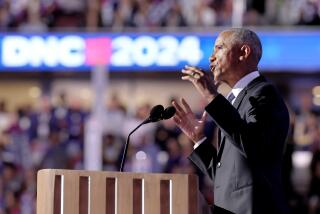A bit of drama, a test of patience at healthcare summit
Reporting from Washington — The healthcare summit had reached the point on the agenda where discussion was supposed to center on medical insurance.
But Sen. John McCain (R-Ariz.) wanted to talk about something else -- and did, accusing Democrats of working in secret and cutting backroom deals, even promising a $100-million sweetener for Nebraskans known as the “Cornhusker kickback.”
Losing patience, President Obama tried unsuccessfully to cut him off, telling his 2008 campaign opponent: “We’re not campaigning any more. The election is over. . . . We were supposed to be talking about health insurance.”
The testy moment, one of the few bits of drama in a long day of arguments over the intricacies of the healthcare system, captured the problem Obama faced in the made-for-television production he had helped choreograph. And in a larger sense, it was a microcosm of the whole yearlong struggle over healthcare.
It was hard to control and messy. Despite a carefully structured agenda, participants kept wandering off-point and insisting on talking about what served their particular interests.
Aware that voters want to see elected officials work cooperatively, the president sat with members of Congress around a square table, symbolically putting them on an equal footing with him. And in doing so he gave Republicans a forum to hammer their talking points over and over.
At times Obama acted less as president than as moderator, chiding lawmakers for hogging the microphone or straying from the point.
At other times, he sounded like a congressional committee chairman. “It’s now 4:15,” the president said. “We have a number of people who haven’t had a chance to speak.”
Still, the forum also showcased some of Obama’s strengths. He demonstrated a mastery of the nuances of healthcare. It is tough to visualize some of his predecessors talking as fluently about catastrophic insurance pools.
And the event addressed criticism that Obama had abandoned a campaign promise to televise high-stakes healthcare negotiations. The summit created the extraordinary spectacle of two branches of government hashing out differences on a major domestic issue before a national audience.
No breakthrough emerged. But Obama may have achieved a political goal, showing the American people he confronts irresolvable differences with Republicans -- a prelude to pushing ahead with a healthcare bill unilaterally.
In the run-up to the summit, Republicans had insisted that Obama not loom over them as a school teacher presides over a classroom. The White House agreed. Having obtained some measure of seating parity, the Republicans seemed emboldened.
Obama sought to emphasize points of common concern and general agreement. But periodically, an exchange would underscore the depth of partisan division.
In a midafternoon session devoted to the deficit, House Republican Minority Leader John A. Boehner of Ohio unleashed a broad attack on the entire plan, calling parts of it unconstitutional.
“This 2,700-page bill will help bankrupt our country,” Boehner said. He labeled it “a dangerous experiment with the best healthcare system in the world. . . . I could go on and on and on.”
When he finished, Obama said Boehner was merely parroting arguments that both sides had been airing over the last year.
“John, the challenge I have here . . . is every so often we have a pretty good conversation trying to get on some specifics, and then we go back to the standard talking points that Democrats and Republicans have had for the last year. . . . There are so many things you just said that people on this side would profoundly disagree with.”
Obama then called on someone else to speak.
Another tense exchange played out between the president and the House Republican whip, Eric Cantor of Virginia. Stacked in front of Cantor were hundreds of pages of text from the Senate-passed version of the bill.
After calling on Cantor, Obama looked at the display and made a mocking reference to the Republican argument that the bill is too long: “Let me guess -- that’s the 2,400-page healthcare bill,” Obama said.
He chided Cantor for displaying the bill for the cameras, calling it a “prop.”
Cantor replied that he had merely brought with him the Senate bill, which “really I think is the basis for the discussion here.”
Obama’s demeanor was alternately professorial and impatient. He spoke in even tones, though some disapproval crept into his voice when he confronted Republican lawmakers who, in his view, were repeating partisan “talking points.”
Not that there wasn’t trouble with his own party. Parochial interests were on full display -- as they’ve been throughout the yearlong healthcare debate.
Senate Majority Leader Harry Reid, locked in a tough reelection campaign in Nevada, gave opening remarks that seemed aimed at voters back home.
“I want to spend a few minutes talking about Nevada, about our country, and not what’s going on here in Washington,” the Democrat said. He then told a story about a restaurant worker from Reno whose family was struggling with insurance bills.
Obama let the meeting run long. But the extra time didn’t produce a compromise.
peter.nicholas@ latimes.com
More to Read
Get the L.A. Times Politics newsletter
Deeply reported insights into legislation, politics and policy from Sacramento, Washington and beyond. In your inbox three times per week.
You may occasionally receive promotional content from the Los Angeles Times.










